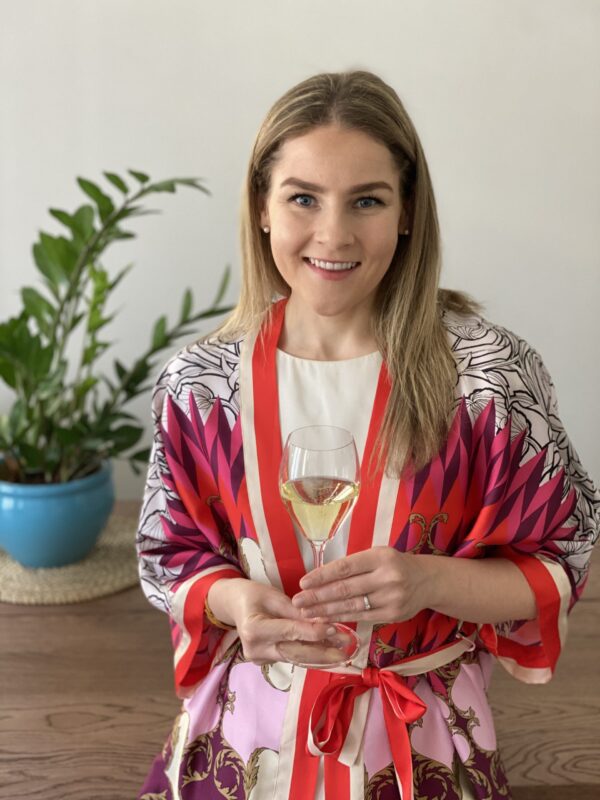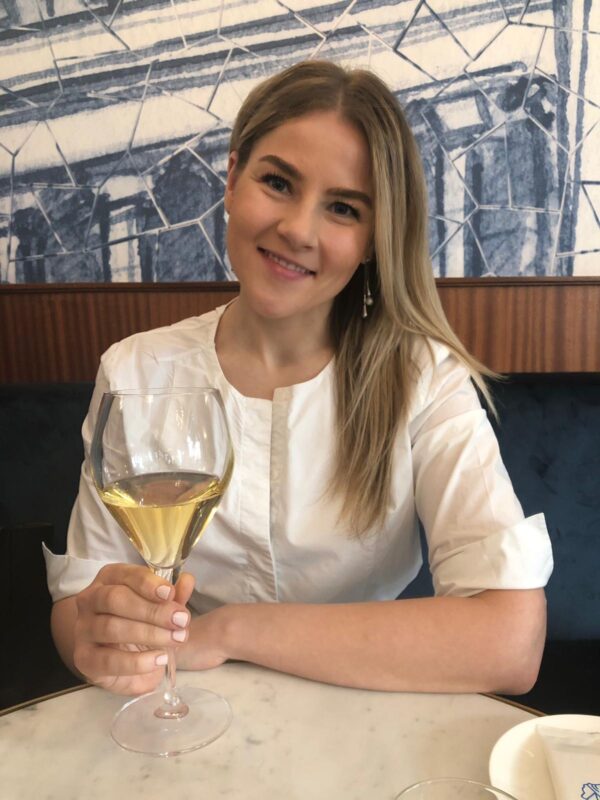How educating women about good quality wine will encourage them to spend their money wisely and translate into professional success. This is the new face of “Happy Hour” in Milan – Meet Polish born entrepreneur, Magdalena Kuffel, who launched her own wine brand and social club in Italy. Using her analytical and interpretive skills she can refocus her business and help others at the same time.
Her newsletter is now helping Italian wine producers with additional promotion during the Covid19 crisis. Many of them produce excellent wines but due to their small size, they are more vulnerable to a drop in sales.
I want to introduce you to my friend, Magdalena.
I appreciate ambitious women who know what they want and who are driven and independent. Coming across such ladies in a big town is not easy, not to mention to cultivate a friendship – and this is where MOA Club is stepping in.
Magdalena Kuffel

1) We connected on Instagram which I love! Our ability to connect with other like-minded people and even establish friendships is one of the big pluses of social media. What was so interesting for me about your story is how you are combing the power of female friendship and wine together. Can you tell me how that idea came out and why you decided to create the MOA Club?
MOA Club has been created initially as a “side-product” of a different wine project. Approximately two years ago, I created a blend of sparkling rosé (under the same brand) which was sold in Poland. The market had not been chosen casually; I was raised in Poland until my teens and I have seen this country grow economically at the incredibly fast speed. There is curiosity and “hunger” for new quality products, especially amongst women who are holding big share of a “new wealth”.
Once I brought the wine to the market, I understood that a great product with great packaging was not enough to get attention of the potential customers. As marketing of alcohol is not permitted in Poland, the only way to present my wine was a direct contact with potential consumers. During such encounters, I had a chance to explain the production process of the wine, what makes this bottle worth paying more in comparison to the supermarket products etc. I quickly understood that without wine education, the wine won’t sell.
Currently, there are no bottles available for sale (we have decided to pause the sales for approx. 1.5 year, to change the business model) but the idea of the wine club remained at the back of my head. Meetings with women curious about wine with whom I could share my passion was giving me a lot of positive energy!

In the same time, I knew that the idea of “wine club” is nothing new and if we were to take our space – MOA Club had to be something different.
I sat down and I tried to imagine a wine club that I would like to join myself.
I truly enjoy good aesthetics, elegant interiors and good meals. I appreciate ambitious women who know what they want and who are driven and independent. Coming across such ladies in a big town is not easy, not to mention to cultivate a friendship – and this is where MOA Club is steping in.
The idea of MOA Club is to create space for women to meet and bond; and we all know that bonding is better with a glass of wine and a delicious meal. I did not want to organize another “happy hour” gathering, that won’t enrich anyone lives.
Naturally, I wanted to share my passion to wine but I also wanted to share the idea of drinking responsibly and spending money on alcohol in a sustainable manner. I believe we should be more aware (and talk more) about the consequences of over-drinking/binge drinking among young women; I hope that educating them about good quality wine will encourage them to spend their money wisely – what might mean drinking one glass of wine instead of four beers. I also believe that once one understands how much effort it takes to create a bottle of wine, its cost is seen in completely different light.

2) Before you crossed over into wine you worked in the energy industry, correct? How have you applied some of these skills into building MOA?
I worked as energy markets analyst which I believe formed my way of thinking and perceiving the world. Analyzing and interpreting the world comes naturally to me – it is a very useful skill during wine tasting, which is a must if you run a wine business.
Power markets are very dynamic working environment, which teach discipline and attention to detail – I think it is essential while creating any business!
3) I want to know your story and how you become so passionate about wine. Where did that start?
It is hard to pin-point when my passion had started… I had always paid attention to what I ate and drunk, but my passioned flourished when I moved to Italy. The more wines I tried, the more I understood it is not only a beverage. It is a history, a craft (still passed mainly from one generation to the other), a fruit of human connection to nature.

The first time I heard the expression that wine is alive, it completely blew my mind. I hadn’t gotten an idea what it meant. Only later I understood that the process of wine making is not over when the wine is “made”. Wine is constantly changing and I think that this is what ultimately attracted me to this world the most. You never get the same product, even though you think you do. With a bit of care and attention, you will notice subtle differences that makes “having a simple glass” a sensuary experience. I just like to light up my life with things like that ☺
4) What obstacles or challenges have you encountered being a female working in wine in Italy?
As for now, the challenges I’ve encountered are not gender related (who knows, maybe working in the energy sector, being always one of a few women hardened me!). Bureaucracy is a heavy subject for me – as for many entrepreneurs – but with the help of those who know more than me, every problem can be solved.

5) We are living in what will be recorded as a historical turning point globally during the Covid19 crisis. You are in Italy. What has your personal experience been during this time?
I almost feel like saying that we are making history! (haha!)
As most of the crisis situations, they are causing bitter-sweet emotions. I am very happy that my loved ones are healthy and truly grateful that I have an opportunity to work from home.
In the same time, I am concerned about the state of Italian economy, which depends heavily on the production of high-end goods and tourism. I hope that these branches of business will get back fast on their feet.
I have to admit that the lockdown was another reason that motivated me to start the newsletter – I thought that Italian wine producers need some additional promotion in this difficult time. Many of them produce excellent wines but due to their small size, they are not immune to drop in sales.
If we can talk about what Italy has to offer, I hope that it will help this area of business, at least slightly. If not now – hopefully in the long term.

6) How are you looking to pivot your business more to digital?
MOA Club Newsletter (a weekly newsletter dedicated to the Italian wine and wine tasting, send directly to the email) has been always a strong point in our business idea. Naturally, we have events and community, but in the meantime, I wanted to keep our readers curious.
Also social media presence is an important aspect of MOA Club, but I would not want the traffic on social media to replace the events and the newsletter; I treat it more as an encouragement for new members to subscribe.

7) MOA Club is going to present two signature wines: rosé and prosecco. That is really exciting! Can you tell me more about these wines?
MOA Rosé and prosecco are blends developed with a thought of women as a customer; both of them are suitable to be drunk with a meal, as well as an aperitif.
MOA wines are produced in the region of Valdobbiadene, the historical region of prosecco, which I find very important to share. Unfortunately, prosecco does not have a “good marketing”, being perceive as cheap wine – I want to change that with an excellent quality product.
Even though they have low sugar content, I wanted to create a blend that is suitable for the “newbie palate”. I have noticed that French and Italian people, who are growing up with wine drinking tradition, are enjoying very dry wines, often with high acidity. On the contrary, Eastern Europeans, Asians and Americans prefer the taste to be slightly sweeter, less decisive I’d say. I wanted to combine these two preferences.
8) How do readers connect with you ?
The best way to connect is via our instagram (moaclub.wine) or directly via website: moaclub.net